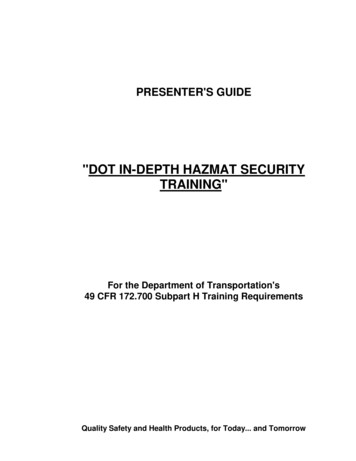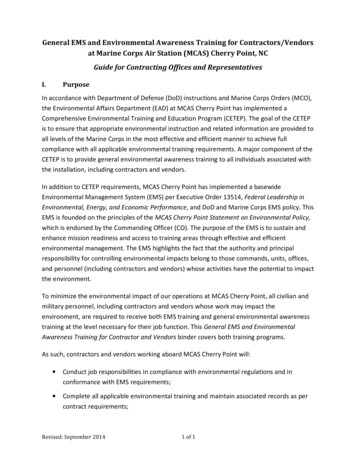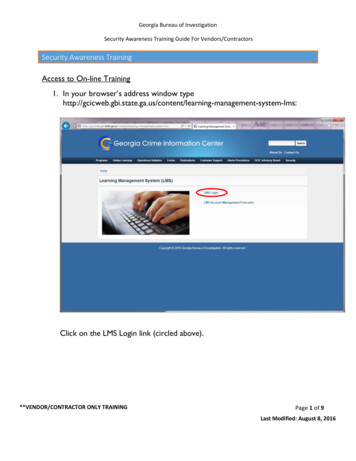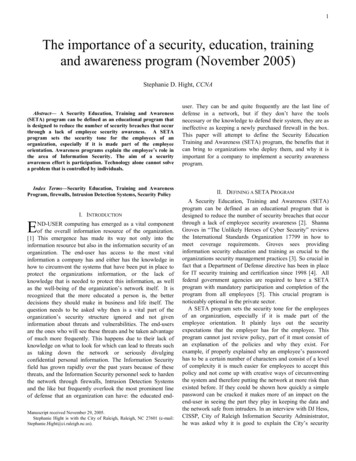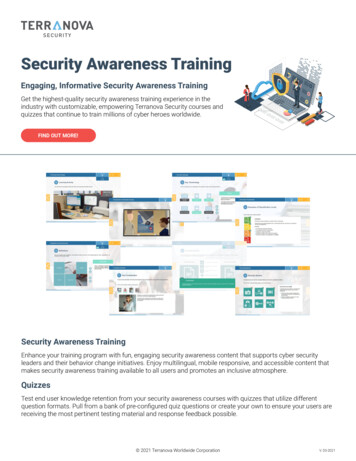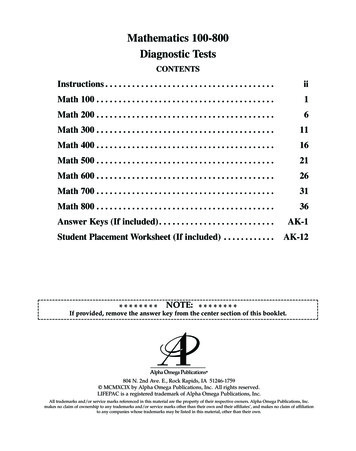![Security Awareness Training 2015 Level I (002) [Read-Only]](/img/31/cogenttraininglevel1.jpg)
Transcription
Level 1:Baseline security awareness training for allauthorized personnel with access to CJI.COMMONWEALTH LAW ENFORCEMENT ASSISTANCE NETWORK
Rules that describe responsibilities and expected behavior with regard to CJIusage. Implications of noncompliance. Incident response (Points of contact; Individual actions). Media protection. Visitor control and physical access to spaces—discuss applicable physicalsecurity policy and procedures, e.g., challenge strangers, report unusualactivity. Protect information subject to confidentiality concerns — hardcopy throughdestruction. Proper handling and marking of CJI. Threats, vulnerabilities, and risks associated with handling of CJI. Dissemination and destruction.Level 1COMMONWEALTH LAW ENFORCEMENT ASSISTANCE NETWORK
What:The protection of Criminal Justice Information (CJI) originating from theDepartment of Justice (FBI CJIS data).When:“Basic security awareness training shall be required within six months ofinitial assignment, and biennially thereafter, for all personnel who haveaccess to CJI.”Who:All authorized personnel with access (physical, logical) to CJI. This includesvendors and anyone who works on/maintains a technical component that isused to send, receive, process or route a transaction to/from systems thatprocesses or maintains FBI CJIS Data.Why:Not only is it required per CJIS Policy, it is each individual’s responsibility toprotect CJI with all due diligence. Even the most technically and physicallysecure environments are subject to threats due to a lack of due diligenceand/or inappropriate conduct from the insider.Level 1COMMONWEALTH LAW ENFORCEMENT ASSISTANCE NETWORK
What are we protecting?Rules that describe responsibilities and expected behavior with regard toCJI usage.FBI CJIS data is any data derived from the national CJIS Division systems.Many state CJIS systems (they include state hot file and criminal history data) containFBI CJIS data and must be afforded the same security as national systems.Criminal History Record Information (CHRI) is arrest‐based data and any derivativeinformation from that record.1. Descriptive Data4. Conviction Status2. Sentencing Data5. Incarceration3. FBI Number6. Probation & Parole InfoThe Interstate Identification Index (III) is also, known as “Triple I” provides for thedecentralized interstate exchange of Criminal History Record Information (CHRI) andfunctions as part of the FBI’s CJIS Division’s Integrated Automated FingerprintIdentification System (IAFIS). All 50 states return automated Computerized CriminalHistory (CCH) information to users based on an inquiry and each state may formattheir record response differently.Level 1COMMONWEALTH LAW ENFORCEMENT ASSISTANCE NETWORK
What are we protecting?Rules that describe responsibilities and expected behavior with regard toCJI usage. (continued)Under the III, the FBI maintains an index of persons arrested for felonies or serious misdemeanors understate or federal law.III includes identification data such as the name, birth date, race, sex and FBI/State identification numbers(SIDS) from each state that has information about an individual.Information obtained from the III is considered CHRI and sensitive data and should be treated as such.III may only be accessed for an authorized purpose, and may only be used for the purpose for which it wasoriginally accessed.All users are required to provide a reason for all III inquiries.A criminal justice agency is defined as the courts, State & federal Inspector General Offices, and agovernmental agency or any subunit thereof that performs the administration of criminal justice pursuant toa statute or executive order and that allocates a substantial part of its annual budget to the administration ofcriminal justice.Level 1COMMONWEALTH LAW ENFORCEMENT ASSISTANCE NETWORK
What are we protecting?Rules that describe responsibilities and expected behavior with regard to CJI usage.(continued)Voice transmission of a criminal history should be limited, and details of a criminal history should only begiven over a radio or cell phone when an officer’s safety is in danger or the officer determines that thereis a danger to the public.Most of the files/data obtained from the National Crime Information Center (NCIC) system are consideredrestricted files.There are several files that contain CHRI/CCH information and the dissemination of information should beprotected as such: Gang File Known or Appropriately Suspected Terrorist (KST) File Convicted Persons on Supervised Release File Immigration Violator File National Sex Offender Registry File Historical Protection Order File Identity Theft FileLevel 1COMMONWEALTH LAW ENFORCEMENT ASSISTANCE NETWORK
What are we protecting?Rules that describe responsibilities and expected behavior with regard to CJI usage.(continued)Criminal history record information acquired via CJI Systems is for use by law enforcement and criminaljustice agencies for official criminal justice purposes, consistent with purpose for which the informationwas requested. Each agency is responsible for maintaining a set of current written policies and proceduresthat include how the misuse of the FCIC/NCIC and CCH information will be handled.Administration of criminal justice means performing functions of detection, apprehension, detention, pretrialrelease, post trial release, prosecution, adjudication, correctional supervision, or rehabilitation of accusedpersons or criminal offenders by governmental agencies. The administration of criminal justice includescriminal identification activities and the collection, processing, storage, and dissemination of criminal justiceinformation by governmental agencies.”An agency may use a facsimile machine to send a criminal history providing both the sending and receivingagencies have an ORI and are authorized to receive criminal history information.Unauthorized requests, receipt, release, interception, dissemination or discussion of FBI CJIS Data/CHRIcould result in criminal prosecution and/or termination of employment.Level 1COMMONWEALTH LAW ENFORCEMENT ASSISTANCE NETWORK
Implications of Noncompliance Any access of these systems and/or dissemination of informationobtained for non‐criminal justice purposes are considered a misuse ofthe system. Of the misuse cases that are investigated, most will stem from one of thefollowing categories: affairs of the heart, political motivation, monetarygain, or idle curiosity. Many past cases involved an operator trying to“help out a friend”, but keep in mind,Unauthorized request, receipt or release of CJI material can and hasresulted in criminal proceedings. Improper use of information obtained from any CJI System and/or relatedapplications and devices may be unlawful, violate federal, state and localpolicies and may result in prosecution.Level 1COMMONWEALTH LAW ENFORCEMENT ASSISTANCE NETWORK
Protect information subject to confidentiality concerns(hardcopy through destruction). All agencies are required per CJIS Policy to document and implement policy andprocedures to ensure that access to electronic and physical media in all forms isrestricted to authorized individuals. All agencies shall securely store electronic and physical media within physically securelocations or controlled areas. If physical and personnel restrictions are not feasiblethen data shall be encrypted per section 5.10.1.2 of the CJIS Policy. Electronic media consists of memory devices such as hard drives (removable andresident) and transportable media (flash drives, back‐up tapes, optical disks, memorycards). In addition, security measures must ensure that CJI in physical (printeddocuments, printed imagery, etc.) form be protected at the same level. While encryption is the most optimum form of protection, other measures such aslayered physical security should be implemented and can include tampering proofing,locked cabinets, and secure transport procedures utilizing vetted personnel such asLaw Enforcement Officers. Encryption is the only approved method for email traffic(outside the control of the CJA) containing CJI.LevelCOMMONWEALTH LAW ENFORCEMENT ASSISTANCE NETWORK1
Protect information subject to confidentiality concerns(hardcopy through destruction) When media is no longer required, proper sanitization or destructionmust be carried out. Paper media must be destroyed utilizing approved procedures such asshredding or incineration. Destruction of electronic media shall becarried out by approved methodologies such as degaussing or drivedestruction involving shredding or other satisfactory means ofdestruction. Sanitization of physical media is accomplished by using approved wipingsoftware ensuring a minimal of a 3-pass wipe. It is important to note that sanitization may not be possible for harddrives which fail, therefore, they must be physically destroyed.Degaussing devices must be periodically tested to ensure operability. All sanitization and destruction procedures must be witnessed or carriedout by authorized personnel.Level 1COMMONWEALTH LAW ENFORCEMENT ASSISTANCE NETWORK
Visitor Control and Physical Access All employees are subject to the agency physical protection policy toensure that the security of CJI is maintained. All employees need to remain cognizant of the designated physicallysecure areas and ensure that all personnel abide by access control points,entrance and exit procedures, visitor control and handling procedures.Employees must ensure that CJI, whether in physical or electronic form,remain in the secured areas unless they have specific authorization andprocedures for taking that information out of the physically secure area. Employees are obligated to report violations and/or suspected violations.Furthermore, employees should report areas of sensitive access that maybe unsecure such as emergency exit doors which may have been leftpropped open. Employees need to maintain vigilance in recognizingindividuals who may not have appropriate access and may have been leftunescorted.Level 1COMMONWEALTH LAW ENFORCEMENT ASSISTANCE NETWORK
Incident Response A security incident is a violation or possible violation of the technicalaspects of the CJIS Security Policy that threatens the confidentiality,integrity or availability of state/FBI CJIS data.Discuss Agency Policy/Procedures here: How, who and when to contact. What is applicable for the local agency for level 1 training?Unsecured areas that are designated controlled areas(areas that CJI resides to include communications closets).Level 1COMMONWEALTH LAW ENFORCEMENT ASSISTANCE NETWORK
Proper Handling and Marking of CJI CJI can be leaked inadvertently outside the confines of controlled areaswhen proper handling and marking procedures are not followed. All physical forms of CJI should be clearly marked and labeled ensuringdocuments are maintained according to policy and procedures. It ishighly recommended that documents, at a minimum be clearly labeled.Coversheets designating the sensitive nature of the data and userresponsibility in handling that data should also be considered as anappropriate measure. Electronic forms of media can become mishandledrather quickly due to the hidden nature of the data. Optical media andflash drives should be clearly labeled especially given those forms ofmedia that are not protected by encryption. Lastly, when email containssensitive information, it should be standard practice to label those itemsas well and to ensure transmission is encrypted when applicable.Level 1COMMONWEALTH LAW ENFORCEMENT ASSISTANCE NETWORK
When: "Basic security awareness training shall be required within six months of . FBI CJIS data is any data derived from the national CJIS Division systems. Many state CJIS systems (they include state hot file and criminal history data) contain FBI CJIS data and must be afforded the same security as national systems. .

